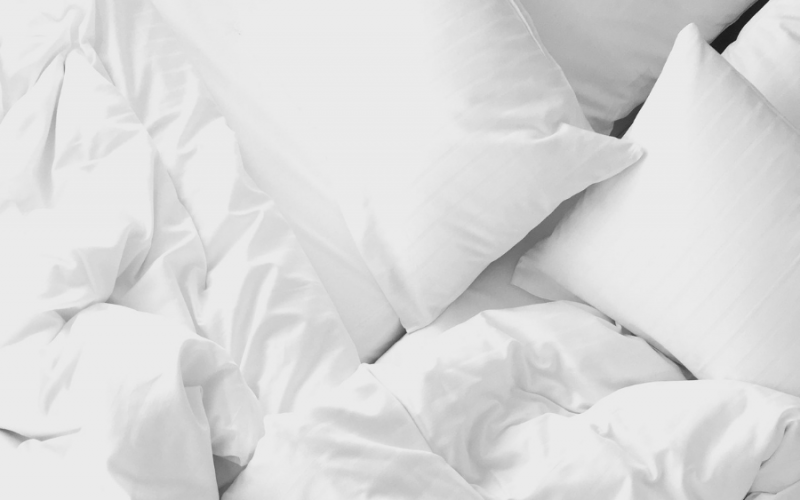Catch some Zzz’s (and a whole load of other benefits at the same time)
Hands up if you’re absolutely knackered *sticks both hands up* – we’re all guilty of not getting enough sleep. Why? Because when that to-do list is growing, sleep is always the thing that takes the hit. It’s recommend that we – as adults – get around 7-9 hours of shut-eye, and yet, here in the UK, we’re under-sleeping by around 1 hour each night. To do some quick maths – we’re basically missing out on 1 full night’s sleep every week, which then – on a yearly scale – adds up to the equivalent of no sleep for around 1.75 months. Sheesh.
A lot of this stems from the whole ‘hustle’ (read: burnout) culture, where we constantly work, even to the detriment to our own mental and physical health. And if you’ve ever stared into the cold, blue light of a laptop at 2am, eating a ‘share-size’ bag of cheese and onion crisps to yourself and wondering if there’s a future where you can just upload your brain to AI and they’ll take care everything for you, then you’ll know this to be true.
In simple terms, the problem is that the tasks we set out to do in a day, take more time than the time we have to do them.
The solution? Do less! Either shave a few bullet points off that to-do list, or instead, shift them over to the to-do list of a Virtual PA. The good thing is, all of our PAs work in 5 minute increments, so you can be totally flexible and only pay for what you need (even if it’s just one of those weeks). This way, you can free up your time to a) get everything done and b) catch some much-needed sleep. Here’s why it’s so important…
Sleep Boosts Your Body’s Defences
Have you ever found that after a few weeks of serious graft and no sleep, you finally finish and ‘BANG!’ your body hits you with the flu from hell? Well, it’s not a coincidence.
Not that it’s the most important thing when you’re sick, but if work is a priority for you, a flu (or worse) could mean that you can barely get out of bed in the morning, nevermind go into work (and infect all your team, by proxy).
When you’re going through those really busy periods, it’s even more important to prioritise sleep. During sleep, your body naturally regenerates itself – it heals wounds, digests food, repairs chemical imbalances and clears out any toxins (eg: all that caffeine you’ve been drinking). When you cut your sleep short, you’re stopping that regeneration in its tracks and so your body doesn’t have all the time it needs to fully repair what needs repaired. According to the NHS, a healthy sleep routine can help to boost your immune system, prevent diabetes, keep weight under control and also prevent heart disease and potentially certain types of cancers. I think it’s safe to say that these alone are well worth an extra few hours in bed.
Sleep Helps Your Mental Health
Even after just one night of crap sleep, our moods are thrown way off and the slightest thing can tip us over the emotional edge. Imagine what continuous bad sleep does on a much longer scale?
Now, our bodies don’t naturally repair our mental health as it does with our physical health as we sleep, but bad or good sleep can have a huge impact on mental health conditions.
For example, depression can sometimes cause sleep problems (like insomnia and sleep apnea) and just to return the favour, sleep problems can contribute towards existing depressive disorders.
With stress and anxiety, it can be slightly different. As with depression, stress and anxiety can cause (or worsen) sleep conditions, but even more severely, lack of sleep can actually cause an anxiety disorder. And what do we do when we’re tired? We drink loads of coffee, which isn’t exactly the best thing to add to a cocktail of anxiety.
When we feel depressed or anxious, we’ve all been sold on this notion of ‘self-care’ in the form of yoga classes, sensory deprivation tank and literally anything but sleep. We put time (and money) aside for these actions of self-care, when really all we need is some shut-eye. And yes, this is coming from someone who regularly has to fight falling asleep in child’s pose.
Sleep Supercharges Productivity
Sleeping always ends up last on the list for busy people, because they think that they need more time to get their work done. But, a solid 8 hours of productive work is a lot more valuable than 18 hours of staring at the screen and taking 10 minutes to write a sentence.
In fact, lack of sleep is scientifically proven to decrease productivity. When we don’t get enough sleep, it disrupts our brain cells’ ability to communicate with each other, leading to temporary mental lapses that affect memory (which is why you might’ve forgotten the reason why you’ve walked into the kitchen for the third time today). Even if you’re the slightest bit sleep-deprived, you have a 50% slower response time and a lower accuracy rate on simple tasks than someone who has been drinking alcohol – fifty percent.
On the flip side, according to The National Sleep Foundation, having a good sleep pattern means that you can recover from distractions quicker, be more accurate with split second decisions and make the most of our Circadian Rhythms – which boost our brains to their peak in that 2.5-4hr window after we’ve woken up.
All of this means less brain fog, more alert responses and perhaps, disconnecting that drip of espresso next to your desk.
The Sleep Revolution
Arianna Huffington, Co-Founder of this little thing called The Huffington Post, wrote a New York Times Best Selling book on the benefits of sleep, called ‘The Sleep Revolution’.
She talks about how sleep is linked to virtually every aspect of brain health and by denying ourselves of sleep over time, we’re contributing towards an irreversible loss of brain cells (not to freak you out or anything). However, it proves the point that sleep debt can’t be ‘made up’ – we have to consistently put good sleeping habits in place every night (or at least most nights) and not just get the right amount of rest at the weekends, on holiday, or when we’re dead.
“These two threads that run through our life — one pulling us into the world to achieve and make things happen, the other pulling us back from the world to nourish and replenish ourselves — can seem at odds, but in fact they reinforce each other.” – Arianna Huffington
Even though all this information is out there and our bodies are screaming at us every day that we need to get more sleep, completely changing our attitude towards work/life/sleep balance is easier said than done. It means totally reversing everything we’ve been taught and the pressures that we – and others – put on ourselves. However, even if you’ve been guilty of under-sleeping for the last 30-odd years, it’s worth the investment now for your overall well-being. When it comes to creating that to-do list, take a step back and think about what you can outsource to free your time and make the most of your well-rested, well-hydrated, ready-for-anything brain for what only you can do (and what you enjoy most).
Ready to get some time back? Get in touch to book your Virtual PA.


2 comments
Comments are closed.